HMS Glasgow, the lead ship of the Royal Navy’s new Type 26 frigates, has reached another key milestone with the fitting of the barrel on its 5-inch (127mm) Mk 45 Mod 4A naval gun.
The gun mount itself was installed in 2024 at BAE Systems’ Scotstoun shipyard on the River Clyde, but as of May 2025, the full system is now visually complete with the barrel in place.
All imagery in this article is courtesy of BAE Systems.
The Mk 45 Mod 4A replaces the Royal Navy’s older 4.5-inch Mk 8 gun and represents a leap forward in naval gunnery. The system is capable of firing 31.5kg shells at speeds of up to Mach 3, with greater range and precision than its predecessor.
A key feature of the gun is its advanced automatic Ammunition Handling System. This draws rounds from a below-deck magazine to replenish a ready-use stock of 20 rounds, allowing for sustained fire without manual loading—improving both rate of fire and crew safety.
The fitting of the barrel not only completes the physical installation of the Mk 45 on Glasgow, but also symbolises the continued progress of the Type 26 programme, which aims to deliver cutting-edge anti-submarine warfare frigates to replace the ageing Type 23 fleet.
HMS Glasgow is expected to begin sea trials in 2026 ahead of entering Royal Navy service before the decade’s end.
When complete, the 6,900-tonne, 149-metre-long Type 26 frigates will form the backbone of the Royal Navy’s future surface fleet. Designed to support the full spectrum of naval operations, these advanced warships will specialise in anti-submarine warfare while also being equipped to conduct air defence, maritime security, and humanitarian missions.
Construction across the class is well underway. HMS Cardiff began outfitting at BAE Systems’ Scotstoun yard last year, following HMS Glasgow. HMS Belfast, HMS Birmingham, and HMS Sheffield are progressing at the company’s Govan facilities, while steel cutting for HMS Newcastle is expected to begin later this year. All eight ships are due to enter service between 2028 and 2035.
Each Type 26 frigate will feature cutting-edge capabilities including the Sea Ceptor missile defence system, the 5-inch Mk 45 Mod 4A main gun, a flexible mission bay, Artisan 997 radar, powerful bow and towed array sonars, and a vertical launch silo for various weapon types. The UK programme also supports over 120 domestic suppliers and is aligned with allied efforts in Australia and Canada, who have selected the Type 26 design for their own future fleets—potentially creating a 29-ship multinational programme. The design is also under consideration by Norway for its new frigate programme.


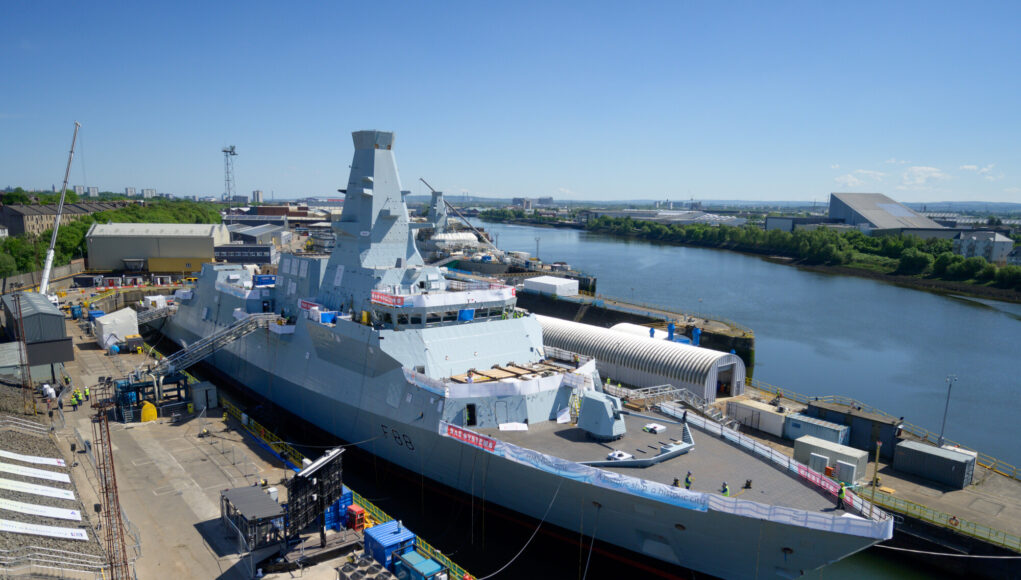

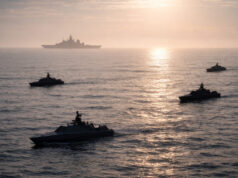
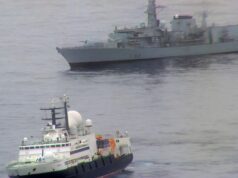
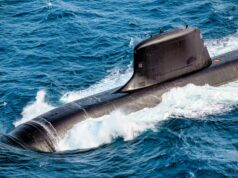
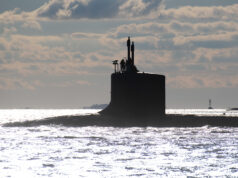
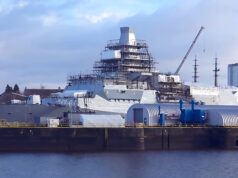
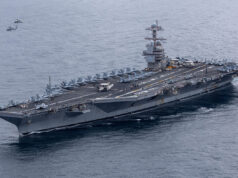
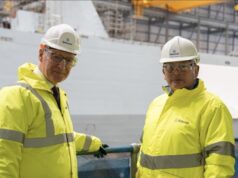
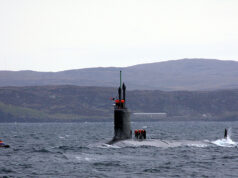
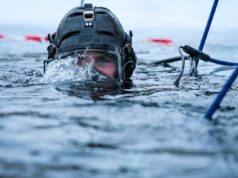
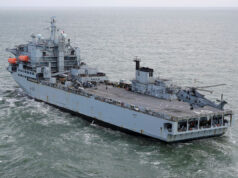

Looks like it’s only the size of a toothbrush.
You’ve been reading the Sun again!
I think it was the Daily Star, in the case of that particular howler!
As good as GB News. When POW sailed from Portsmouth for the CSG 25 deployment the GB News “ defence and security editor” reported in glowing terms of the two Lynx helos on deck, which went out of service eight years ago. Not much of a journalist if he doesn’t know what the services actually have in inventory!
To be fair, the Wildcat was previously named the “Lynx Wildcat”, and is visually fairly similar, especially the naval version.
that’s the way of things nowadays. I was in Blake in1977 she was the last ‘big gunned ship it’s 6 inch gin was awesome and would love been superb gunfire support work in the Falklands in 1982but s he’d been retired
When Russia invaded Ukraine a well known ‘Defence’ correspondent for a well known MSM outlet admitted literally on air to not being an expert in ‘Defence’ matters – I kid you not 🙄
GB News journalists rarely know what the contents of the staff canteen is despite usually having waistlines suggesting they visit it regularly.
that’s the way of things nowadays. I was in Blake in1977 she was the last ‘big gunned ship it’s 6 inch gin was awesome and would love been superb forNGS work in the Falklands in 1982but s he’d been retired
that’s the way of things nowadays. I was in Blake in1977 she was the last ‘big gunned ship it’s 6 inch gin was awesome and would love been superb gunfire support work in the Falklands in 1982but s he’d been retired
I feel like the joke went over the head of your triple post XD
Lol, it did, but knowing Andy, he’d have a few choice words for defence journalists if he knew what you were getting at.
At least they got it fitted for the naming, but what about eveything else that is still missing? Why are we taking so long to build ships? Presumably it’s down to the drip drip of funding?
BAE and the government take a while to build ships on purpose. Longer build times keep shipyards active for longer and therefore we avoid the loss of skills that plagued the Astute-class for example. The ships could be built more quickly if required.
I’m unsure if Babcock does the same, or if their delays are down to it being their first time constructing a major surface combatant.
Its a ridiculous policy, it risks the crew by making them sail in OOD Rustbucket Frigates like the Type 23’s and endangers the realm.
the muchtrumpetedunted national ship holding strategy plan was useless even before the ink dried on it. until another major shipyard is built nothing Will change. paladin in Sunderland still shiftsitshere in a state where investment could see it revived it has a building hall which is more than welcome able to accommodate the build of a frigates the available workforce is available with all.the necessary skills updating and fitting out to be a specialist naval shipbuilding yard. billions went to the Clyde.yet we still waiting for that investment to Bear fruit in the shape of warships ready for the royal navy. reopen paladin shipyard, invest in it the plans were for the site to be used for film and media failed to happen. Google it and you can see the potential it still
offers.
We do not need another shipyard, there isn’t the demand
fitted for, but not with strikes athe Nancy has made the demands 13 frigates would keep our existing yards and more going for years
13 frigates at 2 yards will only keep us going to the mid 2030s, Babcock will be out of work before then
because of the fact that the Clyde yards are badly run have ill motivated workforces and militant unions. no emphasis on getting the orders met I a reasonable timeframe exists.
fitted for, but not with strikes again!
Welcome to Gboard clipboard, any text that you copy will be saved here.whats the point in a grand b ceremony when we are looking at an unfinished Lego model
I’ll bet Kate was well happy to truck all the way to Scotla
nd just to smash a bottle
More importantly, when and exactly where are they going to fit that massive state of the art aircooled, corrugated missile launcher that’s been sat on the dock for yonks ?
Britains new missile is called the “Civil Servant”, Let’s hope it actually works and can be fired.
A nice close look at the VLS behind, as well!
The arrangement of tarps doesn’t seem to match up with what the models have been showing. They all run fore and aft, whereas the mk41 was supposed to be across the ship, closest to the bridge.
I think they are running port-to starboard just the clustering of each bank of cells makes them look fore-aft etc.
Umm…er…pardon moi, but does anyone else sense some overtones of the S. Beckett play, Waiting for Godot, in the Norwegian decision process re selection of the future ASW frigate? Enough analysis paralysis already, make a decision.
We don’t decide for the Norwegians
They are not out of the “Woods” yet.
They stuck the barrel on so it looks good for the naming ceremony.
It will be off tomorrow morning.
Still have too do ” Emergency resupply of ammunition” when the ship does BOST .And that was a bugger with 4.5 Tanked rounds and that was roughly 84 lbs good luck with the 5inch .
Ooh they’ve put the barrel on. That’s tremendous progress
Good to see they’ve filled in the steelwork on the bridge wings as well.
the bridge window wipers are hard to see. very important pieces of the ship
Get up on the wrong side of the bed Andy?
Er, could someone remind me of the weight in webbing and other kit that I carried? Indeed, add in a gpmg and link and rain, and xan I be forgiven fir thinking it was heavier than this reported shell?
Meanwhile, 20 rounds in the ready magazine is negligible. You are going to need some strapping matelots in the loading bay to keep up with expenditure.
Fitting one gun barrel is a “Key” milestone?
Only another 5000 milestones to go then.
not! but at least it’s beginning to look like a fighty ship. at last even though someone forgot to put a torpedo system on it.🤬
Does she keep it until the next ship needs it
I think it was said they cost $50m per set. That’s a very expensive pea shooter.